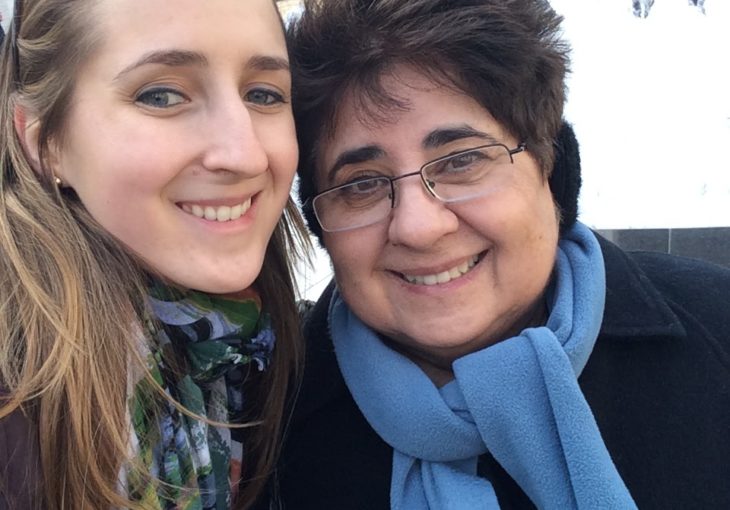By: Meredith Wright Whitaker
“I just thought it was heartburn. I didn’t want you to worry.” “So many women don’t even realize they’re having a heart attack.” “She waited too long to come in after the first one.”
These are some of the memories that surface when I recall the dark weeks of October 2015, when my Mom, Susan Wright, experienced her first heart attack and then the second that took her life. There are many details from that time that I’ll never be able to shake, like the sinking feeling I got when her phone just kept ringing and ringing the morning of October 27th, 2015. And when I finally got ahold of my Dad, all his typical vivacity was gone from his voice, and he said very simply, “Come home.” Even though she was being rushed to the hospital, I knew she was already gone.
While the phrases above are likewise painful for me to reflect upon, they’ve been worth keeping near the surface of my mind as valuable lessons about women’s heart health. Since my Mom’s passing, I’ve learned how she checked a lot of the boxes for the kind of woman that is susceptible to a heart attack. She always put others before herself, to the point of thinking it’s selfish to carve out time for her own physical or mental wellbeing. She juggled many stressors. She also grew up in a time where the healthcare system didn’t prioritize women’s health outside of reproductive care.
I didn’t know much about women’s heart health when my Mom passed, but I recently read a book which details the history of women’s heart health research and care.
It mentioned how the American Heart Association held their first official conference on women and heart disease in 1964, in an event called ‘Hearts and Husbands: The First Women’s Conference on Coronary Heart Disease’…you guessed it, this event was about teaching women how to spot heart disease in their husbands—not about being aware of their own heart health. While great advances have been made in research, clinical practice, and awareness since then, we are all still reckoning with the aftershocks of decades of neglect of women’s cardiovascular health. I learned lessons from the book and from engaging more with the American Heart Association, that I feel every woman deserves to know:
- Heart disease actually claims more female lives each year than breast cancer; in fact, heart disease is the leading cause of death for women in the US.
- For many years, research on heart disease was done exclusively in men, and this has led to the common knowledge about the signs/symptoms of heart attacks to become based on male experiences (e.g., powerful chest pain, and pain down the left arm). We now know that women are more likely than men to have ‘atypical’ heart attack symptoms (e.g., nausea, vomiting, abdominal discomfort, fatigue).
- Women have a tendency to delay going to the ER when they are actually having a heart attack, likely contributing to worse outcomes relative to men. Some women wait because they have not learned that their atypical symptoms may be related to their heart. For others, they wait because they don’t want to be a burden or want to be sure it’s really a heart attack so they will be taken seriously upon arrival.

So much of this speaks directly to my family’s experience—to those phrases I recall so vividly. My Mom had been having really bad heartburn for a few days but hadn’t mentioned it in our phone calls since she didn’t think it was a big deal. Honestly, even if she had mentioned it, I doubt I would have made the connection between her experience and heart attacks. I remember my cousin, who is a travel ER nurse, telling me how often she’d seen women in the ER who likewise had no idea what they were feeling was a heart attack. And after my Mom’s death, when I called her cardiologist, he speculated that she’d likely waited too long for treatment during the first heart attack and just accumulated too much heart damage.
I can’t even begin to describe how much I miss my Mom, and all the things I wish she’d been able to experience before her passing. We were incredibly close, often speaking multiple times a day, and she taught me everything I know about kindness, class, and the importance of extending love to others. My Mom loved to dance and be silly, was a fierce advocate for my brother who has special needs, cooked beautiful healthy meals, and was an expert gardener. I wish my family and I had known all we know now about women’s heart health. Thankfully, the likes of the AHA are working hard to promote women’s heart health, with efforts aimed at both healthcare providers and the general public to set the record straight about the female experience. I urge women everywhere to take my Mom’s story to heart (pun intended); you know your body well, so take action if something feels off. Take this Heart Month to learn a bit about heart health, and know that it is never selfish to take steps towards promoting your own health and wellness.
The views, opinions and positions expressed within these guest posts are those of the author alone and do not represent those of The American Heart Association. The accuracy, completeness and validity of any statements made within this article are not guaranteed. We accept no liability for any errors, omissions or representations. The copyright of this content belongs to the author and any liability with regards to infringement of intellectual property rights remains with them.
The American Heart Association’s blog is not intended to provide medical advice or treatment. Only your healthcare provider can provide that. The American Heart Association recommends that you consult your healthcare provider regarding your personal health matters. If you think you are having a heart attack, stroke or another emergency, please call 911 immediately.
